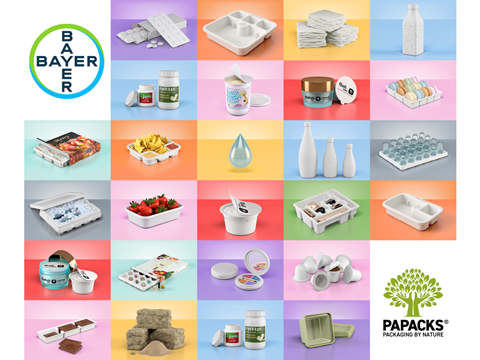
Bayer is teaming up with PAPACKS to develop biodegradable, fibre-based packaging for consumer health brands like Aspirin, Bepanthen, and Claritin – a step towards its goal of achieving 100% reusable or recycle-ready packaging by 2030.
Intending to replace the products’ traditional plastic packaging, the partners plan to utilize ‘responsible’ virgin fibres and PAPACKS’ moulded pulp technology, which makes use of materials derived from renewable sources and a plant-based coating.
Bayer aims to ensure that all the packaging used for its self-care products contributes to a circular economy via recyclability or reusability.
“Reducing plastic utilization is one of the greatest challenges of our industry, so we’re proud to join forces with PAPACKS to accelerate progress towards using eco-friendly, renewable sources for our packaging,” said Jesse DelGigante, directorof Global Packaging Innovation for Bayer’s Consumer Health division. “This collaboration is a strong step forward in our sustainable packaging journey.”
Tahsin Dag, founder & CEO of Papacks, continued: “We’re looking forward to the challenge of combining our unique pulp technology with plant-based coating with the rigorous standards mandated by regulatory agencies for over-the-counter medicines. We expect this collaboration to help redefine packaging standards for the industry.”
The news comes after Bayer joined PA Consulting and PulPac’s Blister Pack Collective last year. This coalition has set its sights on eliminating 100,000 tonnes of plastic packaging – especially ‘problem plastics’ like PVC – from medicinal product lines every year.
Meanwhile, PAPACKS has signed a Memorandum of Understanding with industrial hemp provider element6 Dynamics in an effort to increase the amount of hemp-based moulded and thermal-formed packaging on the US market and phase out conventional plastics.
It is also working with European Material Bank in a strategic cooperation agreement set to boost the exploration, development, processing, and production of renewable raw materials like sugar cane, eucalyptus, and bamboo across the world.
If you liked this story, you might also enjoy:
How are the top brands progressing on packaging sustainability?
The ultimate guide to global plastic sustainability regulation














No comments yet